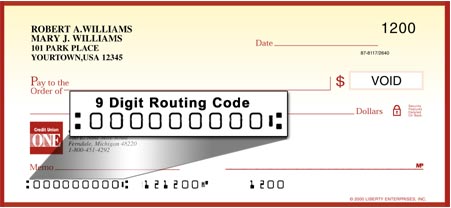|
ABA (American Banking
Association) routing number
See defintion under Transit or
Routing code.
Age of Majority
See Account Types - Custodial.
Account Status
Depending on the current state of your MyStockFund
brokerage account, MSFS will assign a status to your account. You can view your
account status from your Member Home page. The account status controls your
online account activities in which you can participate. For example, once you
open a MyStockFund brokerage account, you may access the Member site, set up
your AutoVest Schedule, research stocks, etc. However, you will not be able to
engage in MyStockFund transactions such as purchasing or selling stocks until
your account and Cash Link are both "Active." You will be notified via email
that your account and Cash Link have been activated.
For more information about a specific status, see: Pending,
Active, Restricted, or
Closed.
Account Types
Custodial - an
account set up by an adult for the benefit of a minor. The child becomes the
sole owner and has full rights to the account when he/she reaches the age of
majority in that state. The age of majority is usually 21, except in the
following states where it is currently 18: AK, CA, DC, KY, LA, ME, MI, NV, SC,
SD, VA. Consult the laws in your state for more information.
Joint - an account
co-owned by two or more individuals.
Individual - an
account owned by one individual. The individual must be of legal age to open an
account. Legal age varies by state, but it is typically 21 except in the
following states where it is 18: AK, CA, DC, KY, LA, ME, MI, NV, SC, SD, VA.
Corporate - an
account set up by a corporation.
Investment
Club - an account owned by an investment club that is
managed by one authorized agent.
Partnership - an
account owned by a partnership with a designated authorized agent for the
group.
Trust - a brokerage
account set up under legal arrangement of a trust.
Automated Clearing House (ACH) transfer
An electronic funds transfer. MyStockFund uses ACH to fund
stock purchases, collect the annual subscription fee, and can use ACH to
withdraw funds from your MyStockFund cash account into your checking or savings
account. Most financial institutions, credit unions and other financial
institutions participate in the ACH network and are therefore able to send
funds this way, but it's best to check with your financial institution before
authorizing an ACH transaction.
AutoVest Schedule
AutoVest is a tool that helps you build your portfolio
over time with regular automatic investments in your favorite securities. You
may invest as little as $10.00 (or as much as you’d like) in each security and
schedule a “plan purchase” on a weekly or monthly basis. This helps you to
dollar cost average your investments while making it simple to diversify. You
may edit your AutoVest Schedule at any time to change with your budget and
financial objectives. For your convenience, AutoVest purchases are funded
automatically through Cash Link! Cash Link will automatically debit your
financial institution one day prior of your scheduled investment(s).
Active Status
Your account will be set to an "Active" status once you
have completed the application process and your Cash Link has been activated.
Registration for Investment Club, Corporate, Partnership and Trust accounts
require additional authorization before an account can be activated. You will
be notified via email if your account requires additional authorization as well
as an email that your Cash Link has been activated.
Asset
Any item of economic value owned by an individual or
corporation, especially that which could be converted to cash. Examples are
cash, securities, inventory, a house, a car, or other property. On a balance
sheet, assets are equal to the sum of liabilities, common stock, preferred
stock and retained earnings.
Available Cash
"Available Cash" is the term used for available funds that have not yet been
committed to any pending purchases or withdrawals. Available cash can be used
for One-time Plan Purchases, Real-time purchases or may be withdrawn from your
account at any time. All cash in your account will automatically be invested
into an insured interest bearing account. Each account will be paid a rate of
interest, which may fluctuate daily depending on market conditions. Interest
will accrue from the date of deposit to the last full day before the date of
withdrawal and is compounded and credited monthly. There is no minimum period
that money must remain on deposit and consequently, there is no penalty for
withdrawals of your entire balance or any part thereof at any time without
notice.
Backup Withholding
A tax-collection method whereby a percentage of your
income (31%) is deducted by the payer and sent to the Internal Revenue Service.
You are subject to backup withholding if:
-
You do not
provide your taxpayer identification number in the required manner.
-
You provide
an incorrect taxpayer identification number.
-
You did not
certified, when required, that you were not subject to backup withholding.
-
The IRS
notifies the payer to start withholding because you did not report all of your
interest or dividend income. As part of the Registration process, you indicated
whether or not you were subject to backup withholdings.
Broker
In a securities transaction, the individual or firm authorized to act as your
agent. Your broker arranges the transaction, confirming the security, the price
and the number of shares to be bought or sold.
Broker Assisted Trade
MyStockFund Securities offers market orders placed via
phone. ORDERS MUST BE PLACED DURING MARKET HOURS, MONDAY-FRIDAY, 9:30AM -
4:00PM ET, EXCEPT HOLIDAYS.
Capital Gains/Losses
The difference between what you sold an asset for and what
you paid for it. If the difference is positive, you have a capital gain; if
it's negative, you have a loss.
Short-term Gain - if you owned the asset for one
year or less, any gain (or loss) is classified as a short-term gain or loss.
Long-term Gain - if you owned the asset for more
than one year, any gain (or loss) is classified as a long-term gain or loss.
Cash (on deposit)
Any cash on deposit in your account will automatically be
invested into an insured interest bearing account. Each account will be paid a
rate of interest, which may fluctuate daily depending on market conditions.
Interest will accrue from the date of deposit to the last full day before the
date of withdrawal and is compounded and credited monthly. There is no minimum
period that money must remain on deposit and consequently, there is no penalty
for withdrawals of your entire balance or any part thereof at any time without
notice.
Cash Link
Cash Link is a service feature that electronically links
your savings or checking account directly to your MyStockFund account via ACH
(Automated Clearing House) transfer. An active Cash Link is needed to activate
your AutoVest Schedule and helps you to take
full advantage of our service. In addition to AutoVest purchases, you can make
convenient electronic Instant Deposits, or set up automatic Recurring Deposits
for future real-time market orders or One-time Plan Purchases. You may create
or edit your Cash Link at any time through Personal Account Information. It may
take up to six business days to activate a new Cash Link.
Clearing Agent
In a securities transaction, the firm that handles the
actual transfer of funds and securities. Legent
Clearing Corp. performs this role for MyStockFund Securities, Inc.
Closed Status
For your account to be in a "Closed" status, MyStockFund
Securities must receive a signed Close Account Form from the account holder(s).
You will be able to access your account until all cash and/or securities in
your account have been liquidated or transferred to another financial
institution.
Consumer Price Index (CPI)
An indicator of whether individuals are paying more or
less for the goods and services they need to maintain their homes. The CPI is
one measure of inflationary pressures.
Committed Cash
Committed Cash is the term used for funds that have been committed from
Available Cash for pending One-time Plan Purchases or a withdrawal that hasn’t
been processed yet.
Cost Basis
The original cost of an asset, which is usually the price
you paid for it. When you sell securities, you need to determine the original
cost so you can calculate any capital gain or loss.
Corporation
The most common from of business organization that is
chartered by a state and given many legal rights as a separate entity from its
owners.
Corporate Action
Changes in companies that affect their listings on stock
exchanges. Examples of corporate actions are new issues, defunct issues,
mergers and name changes.
CUSIP
A security's identifying number. The nine digits are
assigned by Committee on Uniform Security Identification Procedures (CUSIP).
The first six digits identify the issuer, such as a company, while the last
three digits reveal exactly what kind of security it is, such as a particular
kind of stock or bond. It's good to have CUSIP numbers handy when you're
transferring shares of stock or if you've lost your certificates.
Credit Union
Non-profit, member-owned, financial cooperatives operated
entirely by and for members. When you deposit money in a credit union, you
become a member of the union because your deposit is considered partial
ownership in the organization.
Depository Trust Company
A central repository through which members electronically
transfer stock certificates. The DTC is a member of the Federal Reserve System
and is owned by most of the brokerage houses on Wall Street and the NYSE.
Discount Rate
In calculations of a company's intrinsic value, the term
"discount rate" refers to the gain you'd need to realize to make your
investment in a given stock worth the associated risk ("opportunity costs").
Diversification
Investing in many different securities and asset classes
as a way of reducing total portfolio risk. When you have a diversified
portfolio, gains or losses from one security may be offset by the performance
of other securities
Dividend
For stock investors, a distribution of company profits.
Not all companies declare dividends. Many instead reinvest profits to grow the
business.
Dividend Per Share
The amount of the dividend stated on a per-share basis. If
a company declares a dividend per share of $0.05 and you own 100 shares, you'll
receive a $5 dividend distribution.
Dividend Reinvestment Plan (DRIP)
Buying more shares in a company by automatically
reinvesting any dividends.
Dividend Yield
Dividends earned expressed as a percent of the stocks
price. To calculate a stock's dividend yield, divide the amount of the dividend
earned by the stock's purchase price.
Dollar-Based Purchases
Ability to buy stock for a defined dollar amount (e.g.,
$10 or $15) instead of based on the number of shares (e.g., 10 shares of IBM).
Dollar Cost Averaging
A method of buying shares at regular intervals regardless
of the stock's price. Since you're buying at a range of prices, you effectively
average your cost basis.
Dormant
Dormant - Status given to a security previously added to
your AutoVest Schedule through a one time or Real-time purchase. You may edit
or delete this security at any time.
Dow Jones Industrial Average (DJIA)
A stock performance benchmark comprised of 30 large,
primarily industrial companies that are widely owned and actively traded.
Earnings Per Share
Company profits after deducting for taxes and certain
other payments stated on a per-share basis. For example, a company with annual
earnings of $50 million and $100 million outstanding shares reports earnings
per share of $0.50.
Electronic Funds
Transfer
See "Automated Clearing House (ACH)
Transfer"
eSignature
The electronic transfer of a signature.
Equity Ownership
When you own part of something, you have equity in it.
Stockholders, unlike bondholders, have an ownership interest in the company.
So, for example, when you own 50 shares of Company XYZ's stock, that is your
equity in the corporation. Accordingly, stocks are sometimes referred to as
equity securities or equities.
Exchange Traded Funds
(ETFs)
Exchange Traded Funds (ETFs) represent shares of ownership
in either fund, unit investment trusts, or depository receipts that hold
portfolios of common stocks which closely track the performance and dividend
yield of specific index, either broad market, sector or international. ETFs
give investors the opportunity to buy or sell an entire portfolio of stocks in
a single security, as easily as buying or selling a share of stock. They offer
a wide range of investment opportunities. While similar to an index mutual
fund, ETFs differ from mutual funds in significant ways. Unlike Index mutual
funds, ETFs are priced and can be bought and sold throughout the trading day.
FDIC
Federal Deposit Insurance Corporation. A federal agency
that insures deposits in member financial institutions up to $100,000. Cash and
Money Market balances in your MyStockFund brokerage account are insured by the
FDIC.
Federal Funds Rate
The rate financial institutions charge each other on
overnight loans, typically to meet reserve requirements.
Federal Reserve
The U.S. central bank. The Federal Reserve sets monetary
policy, oversees financial institutions and seeks to maintain financial
stability.
Fractional Share
A fractional share of a security is a partial share.
MyStockFund allows members to purchase securities in specific dollar amounts
which usually results in the purchase of fractional shares. One-time Plan
Purchases and AutoVest purchases feature fractional share investing. Real-time
market orders are placed in whole shares only.
Gross Domestic Product (GDP)
A measure of the U.S. economy's total output of goods and
services.
Individual Retirement Account (IRA)
A type of investment account designed to stimulate
personal retirement savings by offering tax benefits.
Initial Public Offering (IPO)
A company's first public issuance of stock.
Interest
Compensation for the use or forbearance of money.
Investment Club
An organization that is formed when a group of friends,
neighbors, business associates, or others pool their money to invest in stock
or other securities. The club may or may not have a written agreement, a
charter, or bylaws. Usually the group operates informally with members pledging
to pay a regular amount into the club monthly. Some clubs have a committee that
gathers information on securities, selects the most promising securities, and
recommends that the club invest in them. Other clubs rotate these
responsibilities among all their members. Most clubs require all members to
vote for or against all investments, sales, trades, and other transactions.
Investment Interest
The interest you paid or accrued on money you borrowed
that is allocable to property held for investment
IRS 1099-Div
Lists the amount of interest income earned for the year.
MyStockFund is required to report this amount to the IRS. You'll receive a copy
of this form early in the year. You'll want to refer to it when you prepare
your tax return. Interest income is generally taxable to non-retirement account
investors.
iShares
iShares are a family of ETFs. Like stocks they are liquid,
and are like index funds in that they offer the benefits of diversification,
market tracking and relatively low expenses. Each share represents a portfolio
of securities designed to closely track one specific market index.
Legal Change in
Ownership
A per stock transfer in ownership of a security to someone
else. Necessary when the legal status of the brokerage account or account
holder(s) change.
Legent Clearing LLC
Legent has a strong history in the securities clearing
business. Located in Omaha, NE, their experienced personnel provide securities
trade execution, clearing and settlement, maintain records, and assist MSFS
with any other clearing function. It's a member of the New York Stock Exchange
(NYSE) and other principal exchanges, the Financial Industry Regulatory Authority, and the Securities Investor Protection
Corporation.
Liquidate
The conversion of a security to cash, typically through
the sale of that security. Also called “sell-out.”
Market Order
A market order is an order to buy or sell a stock
immediately at the best available current price. A market order guarantees
execution.
Market Capitalization
A measure of a company's total stock market value.
Calculated by multiplying the company's share price by the number of shares
outstanding.
MyStockFund
An online investment service that allows investors to make
incremental purchases in stocks over time, in an affordable and convenient way.
FINRA
Financial Industry Regulatory Authority. A self
regulatory, nonprofit securities industry organization responsible for the
operation and regulation of the NASDAQ stock market and the American Stock
Exchange.
NASDAQ Composite
A stock performance index that represents the performance
of all stocks traded on the NASDAQ over-the-counter market, currently more than
5,000 issues.
NCUSIF
National Credit Union Share Insurance Fund. Deposits in credit unions are
insured to $100,000 by NCUSIF, which is administered by the National Credit
Union Administration (NCUA). Like the FDIC Bank Insurance Fund, the NCUSIF is
backed by the full faith and credit of the USA. All funding for the NCUSIF is
made by insured credit unions.
Non-Sufficient Funds (NSF)
A state in which the funds in an account are not
sufficient to fulfill the obligation of the account holder.
Paused
You may inactivate recurring purchases to a security
indefinitely by changing the frequency to "Paused" in your AutoVest Schedule.
You may re-activate recurring purchases by choosing a monthly or weekly
frequency through the edit process.
Partnership
An unincorporated organization with two or more members
that is formed for federal tax purposes so that its members carry on a trade,
business, financial operation, or venture and divide its profits.
Pending Status
Signifies that MyStockFund Securities requires additional
information before we can activate your account. This may be due to an
incomplete registration (such as a missing signature), or something specific to
your account application. You will receive correspondence from MyStockFund
Securities explaining exactly what information we need to receive prior to
activating your account. For more information, see account
status.
Plan Purchase
A Plan Purchase is a scheduled buy order placed through
AutoVest or the One-time Plan purchase process. MyStockFund aggregates our
members’ fractional share or dollar based orders and goes to market once per
week during our weekly Plan Purchase cycle (every Thursday). By placing buy
orders in this manner, MyStockFund is able to pass the savings off to you. Plan
Purchases are priced according to your respective Investing Plan. Investing in
this manner is a great way to keep your commission costs down while making it
simple to dollar-cost average and diversify over time.
Price/Earnings Ratio (P/E)
Stock price divided by earnings per share. A stock's P/E
is an indication of how much investors are willing to pay for the stock's
earnings potential.
Real Time
Notification or action that is performed immediately, with
no delay.
Restricted Status
If your account status is "Restricted," MyStockFund
Securities has found it necessary to interrupt your use of the service. Please
contact member care as soon as possible for additional information. While in
this status, you will not be able to utilize the MyStockFund service. For more
information, see Account Status.
Russell Index
Various stock performance indices calculated by the Frank
Russell Company. The Russell 3000 is comprised of the 3,000 largest U.S.
companies. The Russell 1000 represents the 1,000 largest of these and the
Russell 2000 includes the smallest 2,000 of these.
S&P 500
A stock performance index that represents the performance
of 500 stocks selected the Standard & Poor's Corporation. Index holdings
are organized under four main sector headings: industrials, utilities,
financial and transportation.
Security
In investments, an asset such as a stock or bond.
Securities and Exchange Commission
(SEC)
The U.S. government agency charged with protecting
investors. On behalf of investors, the agency requires securities issuers to
provide full and fair disclosure. The agency also investigates allegations of
fraud.
SEC Filings
10-K — a company's annual report. Includes business and
management information plus full, audited balance sheet, income and cash flow
statements.
10-Q — a company's quarterly report. Includes unaudited
financials.
Sell
To transfer ownership of a security in exchange for money.
Settlement Date
Date by which an executed order must be settled, either by
a buyer paying for the security with cash, or by a seller delivering the
securities and receiving the proceeds of the sale. The settlement date for
securities is three business days after a trade is executed.
Share
Certificate representing one unit of ownership in a
corporation.
SIPC
Securities Investor Protection Corporation. SIPC provides
members with protection of the assets in their account up to $500,000 of
coverage of which up to $100,000 may be cash. While the SIPC does not protect
against losses from declining market value of investments, the account
protection does apply when an SIPC member firm fails financially and is unable
to meet obligations to securities members. MyStockFund Securities is an SIPC
member, and therefore all MyStockFund accounts are protected by the SIPC.
Source Account
The account that you have specified to be the source of
the funds that will be transferred into your MyStockFund account to pay fees
and/or fund the purchase of securities. Also see Automated Clearing House (ACH)
and electronic funds transfer (EFT).
Stock
An instrument or legal right signifying equity,
or an ownership position, in a corporation
Stock Certificate
A paper that certifies your stock ownership. It lists the
name of the corporation, the number of shares and the stated value. If you
elect to receive stock certificates, your broker cannot trade those shares on
your behalf until you return them. For this reason, most stockholders elect not
to receive stock certificates.
Stock Exchange
A marketplace where securities are traded.
Stock Index(-ices)
Dow Jones Industrials Average — see Dow Jones
Industrials Average above.
NASDAQ Composite — see NASDAQ
Composite above.
Russell — see Russell Index above.
Standard & Poor's 500 — see S&P 500
above.
Substitute Form W-9
An IRS form applicable to interest or dividend accounts on
which the account holder certifies his/her Tax Identification Number (Social
Security Number) and specifies whether he/she is subject to
backup withholding.
Suspended Status
If your Cash Link is “Suspended”, MyStockFund Securities
is awaiting approval that the financial institution information you have
submitted to perform electronic funds transfer (activate the Cash Link
capability) is valid. From the time of submission of the information; either
during registration or when you made a change; the approval takes at least 6
calendar days.
Symbol
See ticker symbol
T + 3
The third business day following the execution of the
trade of a security.
Ticker Symbol
A stock's trading symbol. For example, Coca-Cola trades as
KO.
Total Return
The performance of an asset over a specified period
expressed as a percent. It includes price change plus any dividends or interest
paid.
Transfer
Moving assets (including securities) from one investment
vehicle or custodian to another.
Transit or Routing Code
(ABA)
A nine character number found at the bottom of your checks
that helps track and control your funds as they get processed through the
banking system.

Transfer of Ownership
Giving assets (including securities) to another individual
or organization. Transfers are typically part of an individual's estate
planning, tax planning or charitable giving program.
Trust
A legal arrangement in which an individual who gives
fiduciary control of property to a person or institution for the benefit of
beneficiaries.
Uniform Gift to Minors Act (UGMA)
Custodial accounts that are established for a minor. If a
parent manages the account, the income will be taxed to parent. Investments are
usually restricted by state to life insurance, and certificates of deposit.
Gifts may be given to a trust under the $10,000 per person per year exclusion -
even to the use of life insurance.
Uniform Transfer to Minors Act (UTMA)
Essentially the same as UGMA except that the UTMA allows a
greater use of various investments- mutual funds, partnerships, bonds, stocks,
etc. The UTMA may receive assets from a testamentary transfer and get a full
step up in basis upon death.
Unrealized Gain/Loss
A gain (or loss) which has occurred but has not been
realized through a transaction, such as a stock which has risen in value ( or
fallen in value) but is still being held. Calculated by subtracting the
valuation of a holding in your account from the average purchase price.
Valuation
Calculated by multiplying the number of a company's shares
held in your account by the market value or price per share.
|







